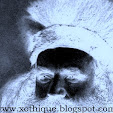About Me

- Jonathan
- Adalbert is a forum for me, to post ephemera, photography, poetry, occasional travel notes, and various spontaneous motions. Cover photo: Parsonage where my great-grandfather spent his early years. Taken near Liegnitz, Silesia, ca. 1870. The "xothique" portion of the web address is a nod to Clark Ashton Smith's fictional continent of Zothique.
Monday, February 13, 2012
Alan Turing: The Enigma, and other biographies
I'm in the midst of reading the challenging biography Alan Turing: The Enigma, by Andrew Hodges, published in 1983. The tome unwinds the tale of Alan Turing, the British mathematician who was one of the pivotal figures in decrypting the Enigma machine system used by the German military for communicating in the 1939-45 War. The book has a good balance, explaining both the private world of Turing and the dramatic historical events in which he was caught. He had an epiphany involving what he called his "universal machine," which ultimately was partly responsible for leading to the development of computers. Turing took the insights he gained from his work with cryptanalysis and applied them as he programmed and helped design some of the very earliest successful computing machines (although he encountered many setbacks and frustrations in these efforts).
The Enigma is one of the longest and most detailed biographies I've read. Others I've read in somewhat recent years, in whole or in part, include Ian Kershaw's biography of Adolf Hitler (I've been working on that on and off for some time, and am currently bogged down in it like a halftrack in Archangelsk in winter), and S.T. Joshi's H.P. Lovecraft: A Life.
I still have a sentimental fondness for L. Sprague De Camp's Lovecraft: A Biography, which I purchased (and read more than once) in abridged, paperback form not long after the hardcover was released. Despite Joshi's (and others) savaging of De Camp's biograpy, L. Sprague does have a way of slashing through to cogent conclusions, as off the mark as he could sometimes be. (As with his misleading theories about Lovecraft's "poikilothermism" and "schizoid" tendences.)
Although I wouldn't press the point very far, the horror visionary and the dictator had at least one or two chance similarites -- their lifespans overlapped pretty closely, and they both had "lost," dropout periods at roughly the same time, in the early 1900s. Despite Joshi's and Kershaw's great scholarship and discoveries, they both are so detail-driven that they sometimes miss the night sky for the stars. Kershaw, even with his massive comprehensiveness, has a few peculiar gaps when discussing the Austrian street person and German chancellor. Curiously, there is almost no discussion in Hubris (at least that I've yet encountered) of the nature and subject matter of Hitler's watercolours and drawings, for example, not even the usual comment (whether accurate or not) about how bad they were.
What is it to be a "failed artist?" Is the art itself a failure, or did one fail at an artistic career? Or both?
Subscribe to:
Post Comments (Atom)


Excellent question, regarding what it is to be a "failed artist." The two words together a cliche or lazy expression.
ReplyDeleteRe hitler's watercolors, I wonder if there is room for a monograph? (maybe there is one.) Seems like it would be an interesting enough book.
Good point about the biographies--Joshi's at least seems to be a special genre, a kind of concordance with which to read all his works.
R, don't know if there's a monograph on the Fuehrer's art -- might be an opening for someone.
ReplyDelete